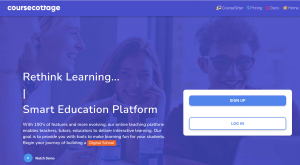Digital Schools Compete with Traditional Schools for share of Learners Attention
A Digital school is a knowledge dissemination entity that distributes, stores, gathers, communicates knowledge to students virtually
BASKING RIDGE, NEW JERSEY, UNITED STATES, September 5, 2021 /EINPresswire.com/ -- What is a Digital School? A Digital school is a knowledge dissemination entity that distributes, stores, gathers, communicates information to students predominantly through virtual modes in the form of structured and unstructured learning. Similar to a Digital Bank, a Digital School provides a virtual mode of interaction for all common school based tasks.
What was already set in motion a few year ago, digital transformation of education has got a strong boost for acceleration over the past 18 months as a result of the pandemic induced home based learning. If any education institute was previously confused or obtuse about their competitors, the pandemic unequivocally elucidated Digital Schools as their main contender.
According to Angela Lee, lead architect for Coursecottage, a platform for creating digital schools, ‘Many education institutes today, entrenched in their beliefs of the importance of brick and mortar campuses, could now be in the same position as video rental stores reminiscent of the late 90’s. Similar to Digital Banks, the idea of Digital Schools could become the norm in the very near future driven primarily by the ease and effectiveness of the delivery medium.‘
While proponents for traditional brick and mortar campuses argue for the need for a space conducive to learning in the form of sprawling lawns, venues to host games, a hall to assemble, a physical classroom with chairs etc., questions are now being raised about the real benefits in relation to how much learning is actually taking place when seen from an single student perspective.
Instead of going to his/her school, a student might as easily spend time in the local park, hang out with pals in the local café, play outdoor games in the little green patch near their house, watch a couple of videos on Trigonometry on the phone. This is precisely what students have been doing for the past 18 months during the pandemic lockdowns and it begs the question about the relevance brick and mortar institutes.
What if the average intelligence of a students has actually spiked over the past 18 months? While there is no mainstream study yet, many believe that this is a very likely scenario once the statistics of grades and measurements kick in. These measurements are going to tell us the value of structured learning, embodied by traditional brick and mortar schools versus unstructured learning, embodied by digital schools.
Unstructured learning gives autonomy for the learners to dictate the pace and therein making it inherently customisable to individual learning abilities. This form of learning is powerful and all-round. One moment the student could be watching a video on geometric shapes, next moment taking a quiz on 19th century poets, next moment sharing a joke with his classmate. All of this is happening albeit a teacher in a physical room.
Digital schools by their very essence are reflective of unstructured learning. Online teaching platforms incorporate digital tools to enhance the unstructured learning experience. Many of these platforms, such as Coursecottage are built with Big data and Artificial Intelligence foundations enabling unstructured learning. The data allows these platforms to make learning highly individualised and effective.
Just as how Netflix can recommend a show based on what you watched previously, Digital schools would be able to match a specific form of learning to a specific student. Example, a recommendation could be; Sandra is likely to learn better if she watched a video made by Veronique on the solar system. This would allow Sandra and Veronique to connect and share comments, likes and build the network together. In this example, Sandra is a student in Paris and Veronique is a student in Kathmandu and both are part of a digital school set up by Tina who is in Seattle and is using the Coursecottage platform to bring all her students together.
Angela Lee
Coursecottage
+1 856-242-7198
contact@coursecottage.com
Build your own Digital School
Legal Disclaimer:
EIN Presswire provides this news content "as is" without warranty of any kind. We do not accept any responsibility or liability for the accuracy, content, images, videos, licenses, completeness, legality, or reliability of the information contained in this article. If you have any complaints or copyright issues related to this article, kindly contact the author above.

